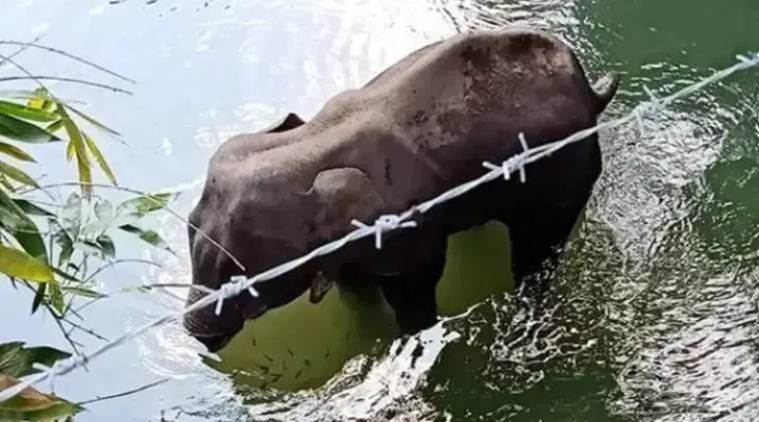 Last month, the wild elephant had suffered a painful death as a result of consuming a fruit laced with explosives. (File Photo)
Last month, the wild elephant had suffered a painful death as a result of consuming a fruit laced with explosives. (File Photo)
The death of a pregnant elephant in the buffer zone of Silent Valley National Park in Kerala’s Palakkad district, after the pachyderm allegedly bit into a coconut filled with firecrackers, has brought to the forefront the state’s growing, unresolved challenge of managing man-animal conflicts.
Thousands of farmers in Kerala have either abandoned cultivation or have stopped nursing their farm lands, especially those close to forest patches, due to the frequent raids by wild elephants, wild boars and of late, monkeys.
The state economic review 2019 has stated that “despite the proactive measures of the (forest) department in mitigating the problems of human-animal conflicts, it continues unresolved… extreme damages are caused by wild elephants and wild boars. Various measures that were adopted include digging elephant-proof trenches, creating elephant-proof walls, constructing solar-powered electric fences… In spite of these preventive measures, it is alarming to note that the number of incidents of human-animal conflict is increasing year by year. In 2018-19, as many as 7,890 incidents were reported, whereas it was 7,229 in 2017-18.’’
A senior forest department officer said, “Many plantations near forests have become land of fodder for wild elephants. New-generation farmers do not stay in estates or farm lands in remote villages and areas adjacent to forests. Loss-making estates and farm lands are unattended. The absence of regular human presence has made such lands a perfect haven for elephants. There would be enough fodder and items such as jackfruits in such lands. In the past, farmers used to take up the job of wildlife protection by preventing the entry of animals into farms. Now, that job has come to forest officials only.”
Forest department data shows that between 2015 and 2020, 416 wild elephants died in Kerala, with 24 deaths attributed to “unnatural causes” — hunting, electrocution, being hit by vehicles and by explosives. During the same period, 514 people were killed in attacks by wild animals, including elephants. In 2019 alone, 15 people were killed in elephant attacks. There have been 246 cases related to wildlife crime in Kerala in 2019.
Two weeks back, the state-run Aralam Farming Corporation in Kannur district was forced to close down 600 acres of an estate block due to elephant menace. As many as 21 wild elephants trooped into the estate from a nearby wildlife sanctuary, stayed in the human habitat for several days, and killed a tribal worker and damaged vast tracts of vegetation. Over the past one year, the estate, which is spread over 4,000 acres, had suffered a loss of Rs 4 crore due to elephant raids, according to official sources.
The forest department official said the fragmentation of forests in the state has also led to elephants straying into farmlands. “Due to mining and other human interventions, elephant habitats have been disturbed. We have to ensure fodder in forests. Also, elephant corridors have to be protected. Eco-tourism projects have ended up as waste-generating ventures in forests,” he said.
However, while the threat of elephants is mainly felt in areas close to forest regions, the presence of wild boars has emerged as a threat to food security in villages and semi-urban areas. In many places, farmers are struggling to protect tubular crops and other food products, forcing them to trap the animals, scare them away using crackers, poison them or even gunning them down.
The forest department official said, “The population of wild boars has increased manifold even in non-forest areas. Jackals used to be the predator of wild boar cubs. Now, the jackal population has gone down… The use of pesticides, mainly in paddy fields and banana plantations, has turned fatal for jackals, which perished in large numbers after consuming crabs which died of exposure to lethal pesticides in such farms. Farmers have to be blamed for creating such a situation.”
The previous Congress government in the state, bowing to pressure from farmers, passed an order that stated that wild boars — barring feeding and pregnant ones — which stray into farms could be culled by forest officials in the presence of local vigilante committees. However, this order could not be implemented due to its complexities, including the issue of identifying pregnant wild boars. Also, only uniformed persons were allowed to gun down the animal.
Last month, the current CPI(M)-led government modified the order to the effect that any person with a licenced gun could shoot down wild boar which posed a threat to cultivation. With this move, any person with a licensed gun — but without no criminal background — can kill wild boar. However, there are very few licensed guns in Kerala.
Kerala Farmers Federation general secretary Joshy Joseph said, “Farmers do not go to forest to provoke the animals… Wild boars have to be controlled for the survival of farmers. The raid of elephants shows that the animals do not have fodder and water in their habitat. The government has to take steps to ensure availability of fodder for elephants in forests. No farmer can suffer the loss of crops at the time of harvest, especially after having nursed them for years. Many people who blame farmers over the man-animal conflict do not know the pain of cultivation.”